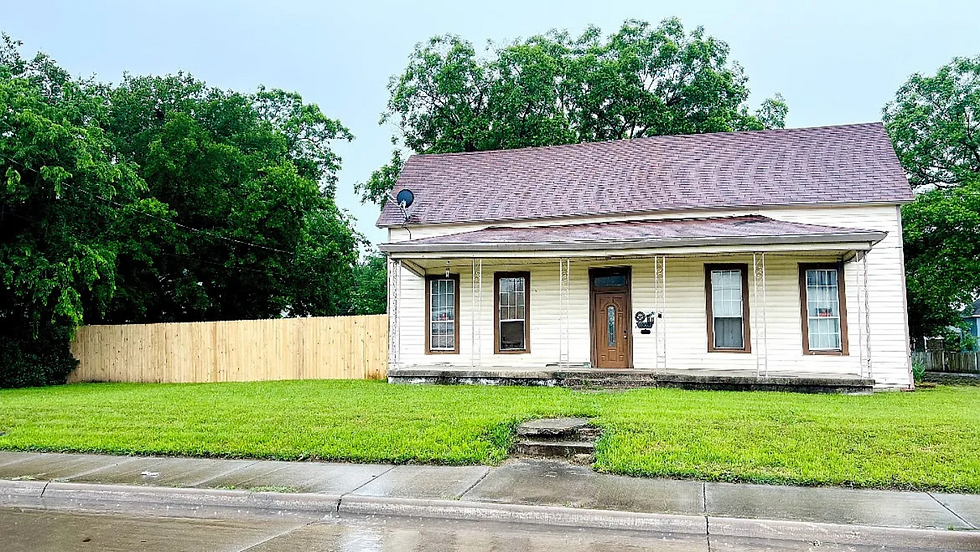Foundation Issues in North Texas: A Homeowner's Complete Guide
- Mark Buskuhl

- Nov 23, 2025
- 9 min read
Understanding, Addressing, and Selling Homes with Foundation Problems
Foundation problems are a fact of life for many North Texas homeowners. The expansive clay soil that characterizes much of the Dallas-Fort Worth area is notorious for causing foundation issues, from minor settling to major structural damage. If you're dealing with foundation problems in your home, you're not alone, and you're not without options.
This comprehensive guide will help you understand the causes of foundation problems in North Texas, recognize the warning signs, explore your repair and selling options, and make informed decisions about your property. As a local real estate investment company with over 20 years of experience in the DFW market, Ninebird Properties has purchased hundreds of homes with foundation issues, and we understand the unique challenges these problems present.
Chapter 1: Understanding North Texas Soil and Foundation Problems
1.1. The Challenge of Expansive Clay Soil
North Texas sits on what geologists call "expansive clay soil," also known as vertisol. This type of soil is characterized by its high clay content, which gives it unique properties that can wreak havoc on home foundations.
How Expansive Clay Works:
Expansive clay soil contains minerals that absorb water and swell significantly when wet, then shrink dramatically when dry. This constant expansion and contraction creates tremendous pressure on foundation systems, causing them to shift, crack, and settle unevenly.
The Seasonal Cycle:
Wet Season (Spring/Early Summer): Heavy rains cause the clay to expand, pushing up against foundations
Dry Season (Late Summer/Fall): Extended drought causes the clay to shrink, creating voids under foundations and causing settling
Freeze/Thaw Cycles: Winter freeze-thaw cycles add additional stress to already compromised foundations
1.2. Types of Foundation Systems in North Texas
Understanding your foundation type is crucial for recognizing problems and determining repair options.
Slab-on-Grade Foundations:
Most common in North Texas homes built after 1960
Concrete slab poured directly on the ground
Most susceptible to soil movement
Repairs can be complex and expensive
Pier and Beam Foundations:
Common in older homes (pre-1960)
Elevated foundation with crawl space underneath
Generally more adaptable to soil movement
Easier to access for repairs
Basement Foundations:
Rare in North Texas due to soil conditions
When present, often experience significant wall movement and cracking
1.3. Why Foundation Problems Are So Common in DFW
Several factors make foundation problems particularly common in the Dallas-Fort Worth area:
Geographic Factors:
Expansive clay soil covers most of the region
Extreme weather patterns with wet springs and dry summers
Periodic drought conditions that cause severe soil shrinkage
Construction Factors:
Rapid development often led to inadequate soil preparation
Many homes built during boom periods with minimal foundation engineering
Older homes built before modern foundation standards
Environmental Factors:
Poor drainage around homes
Inadequate moisture control
Large trees near foundations affecting soil moisture
Plumbing leaks that alter soil moisture content
Chapter 2: Recognizing Foundation Problems
Early detection of foundation problems can save thousands of dollars in repair costs. Here are the warning signs every North Texas homeowner should know:
2.1. Interior Warning Signs
Cracks in Walls and Ceilings:
Hairline cracks may be normal settling
Cracks wider than 1/4 inch indicate potential foundation movement
Diagonal cracks at corners of doors and windows are particularly concerning
Cracks that reappear after being repaired suggest ongoing movement
Door and Window Problems:
Doors that stick or won't close properly
Windows that are difficult to open or close
Gaps around door and window frames
Doors that swing open or closed on their own
Floor Issues:
Uneven or sloping floors
Cracks in tile or hardwood flooring
Squeaky floors where they weren't squeaky before
Gaps between the floor and baseboards
Other Interior Signs:
Cracks where walls meet ceilings
Cabinets or countertops separating from walls
Molding that has pulled away from walls
Nail pops in drywall
2.2. Exterior Warning Signs
Foundation Cracks:
Horizontal cracks are more serious than vertical cracks
Step-pattern cracks in brick or block foundations
Cracks that allow water penetration
Bowing or leaning foundation walls
Structural Issues:
Separation between the foundation and the house
Chimneys that are tilting or separating from the house
Porches or patios that are pulling away from the main structure
Garage doors that won't close properly
Drainage and Moisture Issues:
Standing water around the foundation
Soil erosion near the foundation
Excessive moisture in crawl spaces
Musty odors indicating moisture problems
2.3. When to Call a Professional
While homeowners can identify many warning signs, a professional foundation inspection is recommended if you notice:
Multiple warning signs occurring together
Cracks that are growing or changing
Significant door and window problems
Any horizontal foundation cracks
Water intrusion into the home
Chapter 3: Understanding Foundation Repair Options
If you've identified foundation problems in your North Texas home, you have several repair options. Understanding these options will help you make informed decisions about your property.
3.1. Types of Foundation Repairs
Slab Jacking (Mudjacking):
Process: Drilling holes in the slab and pumping concrete mixture underneath to lift settled areas
Best for: Minor settling issues
Cost: $3,000 - $8,000
Pros: Relatively inexpensive, quick process
Cons: Temporary solution, may need to be repeated
Pressed Piers (Push Piers):
Process: Steel piers driven through unstable soil to bedrock or load-bearing strata
Best for: Severe foundation settlement
Cost: $15,000 - $30,000+
Pros: Permanent solution, can actually lift the foundation
Cons: Expensive, requires heavy equipment
Helical Piers (Screw Piers):
Process: Screw-shaped piers twisted into the ground to stable soil layers
Best for: New construction or lighter structures
Cost: $12,000 - $25,000+
Pros: Less invasive installation, good for tight spaces
Cons: May not be suitable for heavy structures
Concrete Piers:
Process: Drilling holes and pouring concrete piers to stable soil
Best for: Moderate foundation problems
Cost: $10,000 - $20,000+
Pros: Strong, permanent solution
Cons: Requires curing time, weather dependent
Spot Piers:
Process: Installing piers at specific problem areas
Best for: Localized foundation problems
Cost: $8,000 - $15,000
Pros: Less expensive than full perimeter repair
Cons: May not address underlying soil issues
3.2. Factors Affecting Repair Costs
Size and Severity of the Problem:
Minor settling: $3,000 - $8,000
Moderate problems: $8,000 - $15,000
Severe structural issues: $15,000 - $30,000+
Extensive damage: $30,000+
Type of Foundation:
Slab foundations typically more expensive to repair
Pier and beam foundations often less costly
Basement foundations can be extremely expensive
Accessibility:
Easy access reduces costs
Tight spaces or landscaping obstacles increase costs
Interior repairs more expensive than exterior
Soil Conditions:
Depth to stable soil affects pier costs
Extremely expansive clay increases complexity
Rocky soil can increase drilling costs
3.3. Choosing a Foundation Repair Company
What to Look For:
Licensed and insured contractors
Local companies with North Texas experience
Written warranties on work performed
References from recent customers
Better Business Bureau accreditation
Red Flags:
Door-to-door solicitors
Pressure to sign immediately
Significantly lower bids than competitors
No local references
Cash-only payment requirements
Chapter 4: The Hidden Costs of Foundation Problems
Foundation problems affect more than just your home's structure. Understanding the full financial impact is crucial for making informed decisions.
4.1. Direct Repair Costs
As outlined above, foundation repairs can range from a few thousand dollars for minor issues to $30,000 or more for severe problems. However, these direct costs are often just the beginning.
4.2. Secondary Damage Costs
Interior Repairs:
Drywall repair and repainting: $2,000 - $5,000
Flooring replacement: $3,000 - $10,000+
Door and window adjustments: $500 - $2,000
Plumbing repairs from pipe damage: $1,000 - $5,000+
Exterior Repairs:
Brick or siding repair: $2,000 - $8,000
Driveway and walkway repair: $1,000 - $5,000
Landscaping restoration: $1,000 - $3,000
4.3. Ongoing Costs
Increased Utility Bills:
Air leaks from structural gaps
HVAC system working harder due to uneven floors
Potential for $100-300+ monthly increases
Insurance Issues:
Some insurance companies may cancel policies
Higher premiums for homes with foundation history
Difficulty obtaining coverage for future foundation problems
Maintenance Costs:
Regular monitoring and minor repairs
Drainage improvements to prevent future problems
Soil stabilization measures
4.4. Impact on Property Value
Immediate Impact:
Homes with active foundation problems typically sell for 10-20% below market value
Difficulty obtaining traditional financing for buyers
Extended time on market
Long-term Impact:
Even after repairs, homes may have reduced resale value
Required disclosure of previous foundation problems
Potential buyer concerns about future issues
Chapter 5: Selling a House with Foundation Problems
If you're dealing with foundation problems, selling your home may be the most practical solution. However, selling a house with foundation issues presents unique challenges and opportunities.
5.1. Your Selling Options
Option 1: Repair First, Then Sell
Pros:
May achieve higher sale price
Broader pool of potential buyers
Easier financing for buyers
Cons:
High upfront costs with no guarantee of return
Risk of additional problems during repairs
Extended timeline to sale
No guarantee repairs will solve all issues
Option 2: Sell As-Is to Traditional Buyers
Pros:
No upfront repair costs
Faster timeline than repairing first
Cons:
Significantly reduced sale price
Limited buyer pool
Difficulty with traditional financing
Extensive negotiations over price reductions
Option 3: Sell to a Cash Home Buyer
Pros:
No repair costs
Fast closing (7-30 days)
Guaranteed sale
No financing contingencies
Professional handling of foundation issues
Cons:
Purchase price may be below retail market value
5.2. Disclosure Requirements in Texas
Texas law requires sellers to disclose known foundation problems. The Texas Real Estate Commission's Seller's Disclosure Notice specifically asks about foundation problems. Failure to disclose known issues can result in legal liability.
What You Must Disclose:
Known foundation problems
Previous foundation repairs
Ongoing foundation issues
Any structural problems
5.3. Marketing Challenges
Traditional Sale Challenges:
Buyer financing difficulties
Home inspection issues
Appraisal problems
Extended time on market
Multiple price reductions
Cash Sale Advantages:
No financing contingencies
Professional buyers experienced with foundation issues
Quick, certain closing
Minimal marketing time
Chapter 6: Why Ninebird Properties is Your Best Option for Foundation Problem Houses
At Ninebird Properties, we specialize in purchasing homes with foundation problems throughout the Dallas-Fort Worth area. We understand the unique challenges these properties present, and we have the experience and resources to provide fair, fast solutions.
6.1. Our Foundation Expertise
20+ Years of Experience: We've been buying and renovating homes with foundation problems in North Texas for over two decades. We understand the local soil conditions, the best repair methods, and the true costs involved.
Professional Relationships: We work with the best foundation repair companies in the DFW area and can often negotiate better prices due to our volume of work.
Accurate Valuations: We know how to properly value homes with foundation issues, considering both the repair costs and the post-repair value.
6.2. Our Process
Step 1: Initial Consultation We'll discuss your foundation issues and your situation in a confidential, no-pressure conversation.
Step 2: Professional Property Evaluation We'll visit your home and conduct a thorough evaluation of the foundation problems and overall property condition.
Step 3: Fair Cash Offer Within 24 hours, we'll provide you with a fair cash offer based on the current condition of your home.
Step 4: Quick Closing If you accept our offer, we can close in as little as 7 days or on a timeline that works for you.
6.3. Why Choose Us Over Other Options
Compared to Traditional Sale:
No need for costly repairs
No risk of deals falling through
No extended marketing period
No real estate commissions
Compared to Other Cash Buyers:
Local company with deep North Texas roots
Extensive foundation problem experience
Fair, transparent pricing
Professional, respectful service
Compared to Repair-Then-Sell:
No upfront costs
No risk of cost overruns
No additional problems discovered during repairs
Immediate certainty and closure
Chapter 7: Making the Right Decision for Your Situation
Deciding what to do about foundation problems is a significant decision that depends on your unique circumstances. Here are some factors to consider:
7.1. Financial Considerations
If You Have Limited Resources: Selling to a cash buyer may be your best option, as it requires no upfront investment and provides immediate cash.
If You Have Substantial Savings: You might consider repairing first if you plan to stay in the home long-term, but selling may still be more economical.
If You're Facing Financial Hardship: A quick cash sale can provide immediate relief and help you avoid foreclosure or bankruptcy.
7.2. Timeline Considerations
If You Need to Move Quickly: Job relocation, divorce, or other life changes may make a cash sale the most practical option.
If You Have Time: You might explore repair options, but remember that foundation repairs can take months and may uncover additional problems.
7.3. Emotional Considerations
If You Love Your Home: Consider whether the stress and cost of repairs are worth it, or if starting fresh elsewhere might be better.
If You're Ready for a Change: Foundation problems might be the push you need to find a home that better suits your current needs.
Chapter 8: Preventing Foundation Problems in Your Next Home
If you decide to sell your current home and purchase another in North Texas, here are some tips for avoiding foundation problems:
8.1. What to Look for When Buying
Soil and Drainage:
Look for proper grading away from the foundation
Avoid homes with standing water issues
Consider a soil report for new construction
Foundation Type:
Understand the pros and cons of different foundation systems
Look for proper construction techniques
Check for existing foundation problems
Professional Inspections:
Always get a professional foundation inspection
Consider a structural engineer's report for older homes
Don't skip the inspection even for new construction
8.2. Preventive Maintenance
Moisture Control:
Maintain consistent soil moisture around the foundation
Install and maintain proper drainage systems
Fix plumbing leaks immediately
Landscaping:
Keep large trees away from the foundation
Use proper irrigation techniques
Maintain proper grading
Regular Monitoring:
Watch for early warning signs
Address minor issues before they become major problems
Consider annual foundation inspections
Conclusion: You Have Options
Foundation problems can feel overwhelming, but you have options. Whether you choose to repair your foundation, sell traditionally, or sell to a cash buyer like Ninebird Properties, the key is making an informed decision based on your unique situation.
If you're dealing with foundation problems in your North Texas home, we're here to help. We can provide you with a fair, no-obligation cash offer and help you understand all your options. Contact us today for a confidential consultation.
Call us at 972-996-1839 or fill out our online form to get started.
Remember, foundation problems are common in North Texas, and they don't have to ruin your financial future. With the right information and the right partner, you can navigate this challenge and move forward with confidence.
















